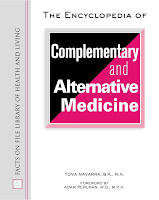One of my patients, suffering from chronic pain from arthritis despite conventional medicines, told me she is much better after acupuncture.
Some of the commonly asked questions by patients are: Can I take herbal medicines? They are natural, right? Does garlic actually reduce cholesterol? I just don't like these drugs; can I try Chinese remedies? Are they harmless?
A lot of people resort to alternative therapies. It has now grown into a $35 billion industry. These nostrums include naturopathy, homeopathy, acupuncture, Ayurvedic medicine, herbal therapy, yoga and meditation, tai chi, mega doses of vitamins and dietary supplements and many more.
All these are grouped under the term complementary and alternative medicine (CAM), defined as medical approaches traditionally not addressed in allopathic or western medicine.
The National Institute of Health established the National Center for Complementary and Alternative Medicine in 1998 to research alternative medicine and disseminate authoritative information to the public and professionals alike.
Be well-informed about alternate therapies, especially herbal supplements, and make wise health decisions. And always let your treating physicians know if you are using alternatives. For information, see nccam.nih.gov on the web.
COMENT:
COMENT:
This news was
posted on August 23, 2012, in a London newspaper.
This is a
collaborative column in which a doctor explains that alternative medicine can
be good or bad.
 He explained through examples that there are people that can be
helped with alternative medicine which allow them to recover quickly. But there
are other people who are affected, causing a worsening of their disease. I have
searched for information and found cases like: An older gentleman who had
coronary bypass surgery twice and still experienced frequent angina decided to
go for chelation therapy. He returned after a few weeks in a much worse
situation. One woman on blood thinners had excessive bleeding that turned out
to be from concomitant usage of a Chinese herb for improved memory.
He explained through examples that there are people that can be
helped with alternative medicine which allow them to recover quickly. But there
are other people who are affected, causing a worsening of their disease. I have
searched for information and found cases like: An older gentleman who had
coronary bypass surgery twice and still experienced frequent angina decided to
go for chelation therapy. He returned after a few weeks in a much worse
situation. One woman on blood thinners had excessive bleeding that turned out
to be from concomitant usage of a Chinese herb for improved memory.
Therefore,
alternative medicine isn’t always good and this studied scientifically proven
to be detrimental contrary. We must ask for studies on this type of medicine as
it can have great benefits, but these should be studied to check for side
effects that can worsen our disease. Such unscientific remedies are big
business worth millions of dollars a year. In another article, Dr. Resden says that
it is not that people are disenchanted with conventional medicine, but they
feel some of these therapies would be complementary to their current regime and
might enhance their health and well being
In my opinion,
these techniques can be supplemented with chemical medicine but they must be
tested, because their secondary effects can be terrible

No hay comentarios:
Publicar un comentario